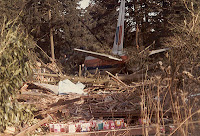President Dieter F. Uchtdorf is a former airline pilot and now an Apostle and member of the First Presidency of The Church of Jesus Christ of Latter-day Saints. During this past General Conference he spoke on the importance of focusing on life’s fundamentals. He urged everyone to put the things that matter most first as he related his message to his flying experiences.
This police episode points out how being distracted by peripheral issues can hurt not only yourself but those that depend on you for their temporal well being. It was Christmas time and I had a few days off during the holidays. I was relaxing at home watching the evening news when the newscaster said a United Airlines plane was having trouble landing.
The plane’s right landing gear had thumped down into position jolting the plane, frightening the passengers, and alerting the captain there was a problem. The evening news followed the story and I began to gather my police equipment that I had brought home for the holidays to clean. If this plane crashed I knew I would be called to help at the scene.
 As a family we continued to watch updates and then at 6:15 PM the plane crashed in a neighborhood just five miles from the airport runway. I was almost ready to leave the house when the phone rang; it was the incident commander ordering all available personnel to immediately report for duty.
As a family we continued to watch updates and then at 6:15 PM the plane crashed in a neighborhood just five miles from the airport runway. I was almost ready to leave the house when the phone rang; it was the incident commander ordering all available personnel to immediately report for duty.The airplane captain had spent too much time evaluating peripheral problems associated with the landing gear and preparing for a crash landing while failing to monitor the fuel level of the aircraft. Fortunately, when he ran out of fuel he looked for an area with only a few residential lights and crash landed the plane there. He hit one unoccupied house and leveled another home. The wreckage path was about 1,554 ft long and about 130 ft wide. Thankfully no one was home so nobody was killed on the ground. There were 189 passengers and crew members. Those killed included 8 passengers and 2 crew members and another 24 passengers were seriously injured.
I arrived on the scene to an amazing site; a DC 8 sitting in a neighborhood, on top of what used to be a house! I will never forget what I witnessed. The front of the airplane was torn off, luggage and airline seats were scattered about and injured passengers and crew members were being given first aid.
I helped move some of the injured to waiting ambulances for transport to a field triage center for evaluation then on to a nearby hospital. The last of the ten deceased persons were being moved to a nearby church that served as a temporary morgue.
By now several hundreds if not a thousand people were pouring into the area to see the crash. All national and local TV news reporters were there trying to cover the story and obtain a unique story or picture. A perimeter was established and I took my place to control the crowd and protect crash site evidence. Several trees had pieces of the aircraft wings imbedded in them and folks were picking up any bit of aircraft they could find for a souvenir.
A Federal Marshall was handing out a flyer showing a picture of a prisoner that was being transported on the airplane and had escaped after the crash. When it became obvious the plane was going to crash he was unhandcuffed. He was hailed by some passengers as a hero for his brave acts of helping others by going back into the plane numerous times to escort injured people out, all the while fearful that the plane would explode. Once the last person was out, the prisoner made his escape, disappearing in the confusion.
Later, prosecutors publicly pleaded for him to turn himself in and promised that he would not be prosecuted for escape. As I recall, that's exactly what the prisoner did after enjoying several days of freedom and as promised the prosecutors did not file escape charges.
The National Transportation Safety Board investigation revealed that while the decision to abort the landing was correct, the accident occurred because the captain and flight crew became so absorbed with diagnosing the problem that they ran out of fuel.
For the next ten days I worked 12 hours on duty and then was off for 12 hours. It was bitter cold. I remember freezing the first night and after that wearing long woolen underwear, wool socks, and two pairs of gloves to try to keep warm. As police officers securing the perimeter day after day in the freezing cold, we also got permission to burn shattered pieces of the destroyed houses in barrels to try and stay warm.
Here I am standing around a burn barrel. We also took hundreds of pictures for spectators to break up the routine of just standing stationary on the crash scene perimeter.








